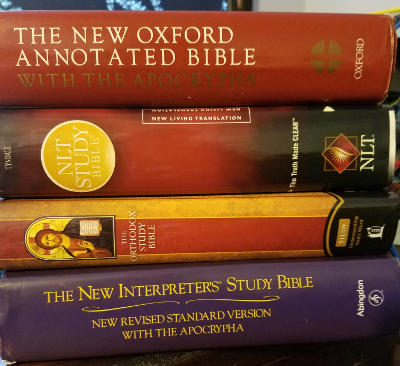Link: The Comma Johanneum
Bill Mounce discusses the evidence that the added trinitarian formula in 1 John 5:7-8 is not original. This is a summary of well-known evidence, not breaking new ground, but is one of the clearest presentations I’ve seen.
Bill Mounce discusses the evidence that the added trinitarian formula in 1 John 5:7-8 is not original. This is a summary of well-known evidence, not breaking new ground, but is one of the clearest presentations I’ve seen.

Dave Black comments some on linguistics and teaching biblical languages in a post today. (Check out the linguistics conference coming up!) The difficulty is the difference between teaching someone a language in a classroom and in discussing and describing that language in some detail as a linguist would want to do. Both the framework and…
I’m continuing looking at the NLT Study Bible (NLTSB) in comparison with the New Interpreter’s Study Bible (NISB), which I have also acquired recently. Today I’m going to add a comparison to the New Oxford Annotated Bible (NOAB). Note that I am still working from the second edition. I think many Methodist ministers or ministerial…
I was planning to leave my comparisons with just Isaiah 63, as I believe that continued comparison charts will largely show the same thing. I’m still reading the translations side by side, and if something seems different I will bring it up. But today in reading Isaiah 64 in several translations I came across Isaiah…
. . . or any Bible translation, for that matter. My post on reading from the KJV elicited a response from Iyov, who doesn’t agree with a number of things, some of which I haven’t said. But some of them I have said, so I want to clarify just a bit. Note that I will…

An overview and rating of The Passion Translation (TPT)I don’t use generic labels but assess translations based on functional and formal criteria, including how much they reword the original language. Despite critics, I found TPT to be expectedly missionary in nature, combining a dynamic approach with considerable formal elements. While the translation’s charismatic roots and its translator’s claims generate controversy, I suggest that readers approach TPT like any other translation—by recognizing its biases and comparing it with others for a fuller understanding.
T. C. Robinson posted the promotional video, in a post titled John MacArthur Charges Bible Translators with Conspiracy, which I’ll embed here for reference: One must make some allowance here for publisher hype, but nonetheless I find the promo a bit cringe-worthy. One of the commenters asks what MacArthur did before he discovered the meaning…